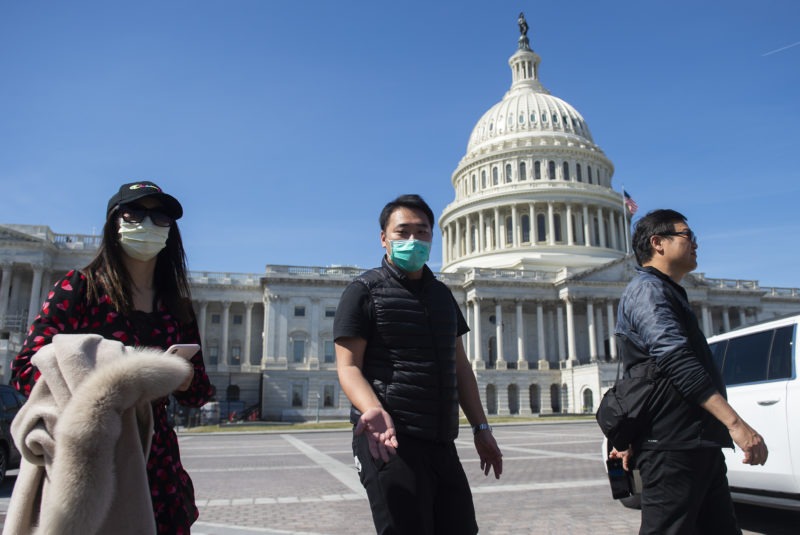Trump economic stimulus measures face virus reality
President Donald Trump is set to propose to Congress measures to aid small businesses and hourly workers, but what form that will take is unknown (Andrew CABALLERO-REYNOLDS)
Washington (AFP) – With the death toll climbing and Wall Street reeling, President Donald Trump met Tuesday with Republican leaders to seek agreement on measures including tax relief to counter the coronavirus threat to the faltering US economy.
The outbreak has prompted US airlines to cancel flights, the Federal Reserve to make its first emergency rate cut in 12 years and the stock exchange to experience its worst session since 2008, though some of that ground was gained back in Tuesday’s trading.
Trump had promised to announce “major” economic measures on Tuesday, but no concrete details had emerged by early evening.
Previous presidents have moved quickly to address the economy in times of crisis, and Trump’s proposal to Congress is aimed at hourly employees and small businesses. It will include aid for workers in the gig economy who worry about calling in sick.
The administration earlier in the day unveiled steps to help airlines and the cruise industry and agreements by insurance companies to waive copay charges for people seeking tests for the virus.
Trump didn’t mention further economic measures after meeting with senators, but CNBC reported the president wants to lower payroll taxes to zero percent through the rest of the year.
“I’ve been saying fiscal response is a more appropriate response to the spreading of the virus,” Rubeela Farooqi, chief US economist at High Frequency Trading, told AFP, pointing to an expansion of paid sick leave as another measure the administration might take.
Given the emphasis on quarantines to keep people from spreading COVID-19, paid sick leave is seen as particularly important, yet is not guaranteed in the US.
“The vast majority of low wage workers have zero paid sick hours,” said Arthur Wheaton, a professor at Cornell University who specializes in labor.
“The most vulnerable or precarious workers in the country have the least protections or security in case of sickness or emergencies,” he added, arguing that workers in the gig economy — drivers for delivery companies or ride-sharing services — are even worse off.
Fight for $15, an organization representing McDonald’s workers, called on the fast food giant to provide paid sick leave to workers whose immediate relatives show symptoms of potential infection and to keep paying workers even if they end up quarantined or if the outbreak requires a restaurant shuts.
– Layoffs –
With few employees and sensitive to drops in demand, small businesses are also seen as vulnerable to the virus’s fallout.
“Business cycles usually hit small retail establishments and restaurants… relatively lightly compared to heavy industries. This one, I think is going to be the reverse,” Alan Blinder, a former Fed vice chair.
Amanda Ballantyne, national director of The Main Street Alliance, which works with small businesses, said employers are asking for expanded unemployment benefits or other forms of direct support.
“There’s a feeling of unpredictability and anxiety. Some businesses have already started contemplating temporary layoffs,” she said, adding “there’s a real need for some kind of stimulus money and emergency support.”
Fears for the wider US economy are real: in a report last week, the Fed said the virus has already disrupted travel and access to goods for US industry, and businesses are fearful it may get worse.
Investors expect the Fed to cut the benchmark borrowing rate again at the March 17-18 policy meeting to stem the economic uncertainty.
Trump’s talk of a tax cut has meanwhile been condemned by the Democratic opposition and also by some economists.
“A payroll tax cut is the politically most expedient way to shovel money to those who need it least,” tweeted Justin Wolfers, an economics professor at the University of Michigan.
Disclaimer: Validity of the above story is for 7 Days from original date of publishing. Source: AFP.


